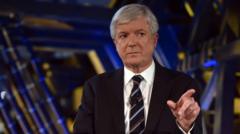Should the BBC Pay Trump Nothing? Insights from a Former Director General

Published: 2025-11-15 14:00:16 | Category: sport
The BBC's recent apology to Donald Trump over a controversial edit in a Panorama episode has sparked significant debate, with former director general Lord Tony Hall asserting that no public funds should be used to compensate the US President. Trump has threatened further legal action, potentially escalating his claims to between $1 billion (£759 million) and $5 billion, which raises questions about the implications for the BBC and its funding structure.
Last updated: 06 October 2023 (BST)
What’s happening now
The BBC is currently embroiled in a legal dispute with Donald Trump following an edited segment in a Panorama programme aired on 28 October 2023. The corporation has acknowledged that the editing created a misleading impression of Trump's speech delivered on 6 January 2021, in which he allegedly called for violent action. Following the backlash and the subsequent apology, Trump has indicated that he may pursue legal action for compensation, despite the BBC's refusal to entertain such demands. This situation has led to the resignation of key BBC figures, including director general Tim Davie and head of news Deborah Turness, raising concerns about the corporation's integrity and future amidst ongoing charter renewal discussions.
Key takeaways
- Former BBC director general Lord Tony Hall opposes any compensation to Trump, citing public funds.
- The BBC has apologised for an editing error in a Panorama episode involving Trump's speech.
- Trump threatens to escalate legal action, claiming damages between $1 billion and $5 billion.
- Resignations at the BBC have heightened scrutiny of its management during critical charter renewal.
- The edit has raised significant questions about the BBC's commitment to impartiality and journalistic standards.
Timeline: how we got here
Understanding the timeline of events provides crucial context to the current situation:
- 6 January 2021: Donald Trump delivers a speech that is later scrutinised for its content and implications.
- 28 October 2023: The BBC airs a Panorama programme featuring an edited version of Trump's speech, leading to public outcry.
- October 2023: The BBC acknowledges the editing error, stating it unintentionally misrepresented Trump’s remarks.
- October 2023: Trump indicates intentions to pursue legal action against the BBC, increasing the potential damages claim.
- October 2023: Following the controversy, Tim Davie and Deborah Turness resign from their positions at the BBC.
What’s new vs what’s known
New today/this week
The situation has escalated with Trump's announcement of his intention to pursue legal action against the BBC, claiming damages that could range significantly. The BBC's recent statement acknowledging their editing mistake is critical in shaping public perception and legal discourse surrounding the issue.
What was already established
Prior to this week's developments, it was established that the BBC's editing of Trump's speech on 6 January 2021 was contentious and led to accusations of bias. Trump's speech itself has been a focal point of legal and political debate since its delivery, with various interpretations influencing ongoing discussions about media responsibility and public trust.
Impact for the UK
Consumers and households
The implications of this case extend beyond media ethics. If the BBC were to face substantial financial penalties, it could affect licence fee payers directly, potentially leading to increased fees or cuts to services. Public sentiment may also shift, impacting how viewers perceive the BBC’s role in reporting on controversial figures and events.
Businesses and jobs
The BBC's current leadership crisis may have broader ramifications for employment within the organisation. As scrutiny intensifies, the potential for job cuts or restructuring could arise, affecting the livelihoods of many BBC employees and their families. Additionally, businesses that rely on the BBC for news dissemination may also feel the repercussions of any operational changes.
Policy and regulation
This incident occurs at a pivotal moment for the BBC, coinciding with its charter renewal process. The resignations of senior figures raise questions about governance and accountability, complicating negotiations with the government regarding funding and operational independence. The outcome of this situation may influence future regulatory frameworks governing public broadcasters in the UK.
Numbers that matter
- 1: The number of high-profile BBC resignations resulting from this controversy.
- £759 million: The lowest figure Trump is threatening to sue the BBC for.
- 5: The potential billion-dollar upper limit on Trump's claims against the BBC.
- 7: The number of years Lord Hall served as director general before stepping down in 2020.
- 0: Instances where the BBC has previously compensated political figures for editorial decisions.
Definitions and jargon buster
- BBC: British Broadcasting Corporation, the UK's public service broadcaster.
- Panorama: A current affairs television programme produced by the BBC.
- Licence fee: A fee paid by UK households for the right to watch live television and use BBC iPlayer.
- Charter renewal: The process through which the BBC's operational framework and funding arrangements are reviewed and approved by Parliament.
How to think about the next steps
Near term (0–4 weeks)
In the immediate future, observers should watch for developments in Trump's legal proceedings against the BBC. Any formal filings or statements from Trump's legal team could provide further insights into the direction of this case.
Medium term (1–6 months)
Within the next six months, the BBC's charter renewal process will likely dominate discussions around governance and funding. The outcomes of this process will set the stage for the BBC's operational strategies moving forward, especially in light of recent controversies.
Signals to watch
- Legal filings from Donald Trump’s team regarding any lawsuits against the BBC.
- Statements from the BBC regarding its governance and future funding strategy.
- Public opinion polls assessing trust in the BBC following the controversy.
Practical guidance
Do
- Stay informed about ongoing developments in the BBC's legal situation with Trump.
- Monitor public opinion regarding the BBC's editorial decisions and governance.
- Consider the implications of this case for the future of public broadcasting in the UK.
Don’t
- Assume that the situation will resolve quickly; legal processes can be lengthy and complex.
- Overlook the broader implications for media ethics and public trust.
- Dismiss the potential impact on BBC funding and services for licence fee payers.
Checklist
- Follow reputable news sources for updates on the BBC and Trump’s ongoing legal dispute.
- Engage in community discussions about the role of the BBC in political reporting.
- Evaluate your own views on public broadcasting funding in light of recent events.
Risks, caveats, and uncertainties
The situation remains fluid, with Trump's legal threats still developing. The potential for further resignations or changes within the BBC's upper management could complicate the public broadcaster's response to this incident. Additionally, the legal landscape surrounding media liability and free speech is evolving, which may affect the outcome of any lawsuits. As such, stakeholders should remain cautious and aware of the potential for unforeseen developments.
Bottom line
The BBC's apology to Donald Trump has sparked a complex legal and ethical debate that could significantly impact public broadcasting in the UK. As the situation unfolds, it is crucial for licence fee payers and stakeholders to consider the implications for media integrity and public trust in the BBC's commitment to impartial journalism.
FAQs
Why did the BBC apologise to Trump?
The BBC apologised because an edited segment of Trump's speech misrepresented his remarks, creating a misleading impression that he called for violence.
What are the potential financial implications for the BBC?
If Trump proceeds with his legal action, he could claim damages ranging from $1 billion to $5 billion, which could impact BBC funding and services.
What does this mean for BBC's leadership?
The resignations of key figures in the BBC raise concerns about governance and the corporation's ability to navigate its charter renewal amid ongoing scrutiny.



